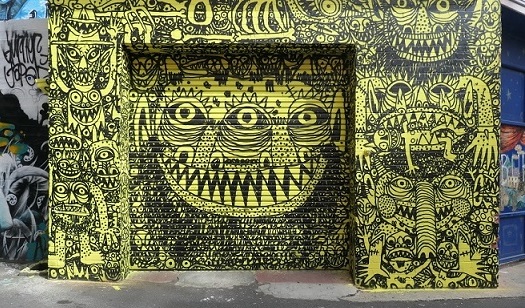藝評
航班取消 | Flight cancellation
約翰百德 (John BATTEN)
at 4:54pm on 24th February 2020

圖片說明:
澳洲各大城市都可以找到色彩繽紛的街頭壁畫。這幅出自澳洲藝術家Tom O''Hern手筆,位於澳洲塔斯曼尼亞荷伯特Bidencope Lane的壁畫作品,在此畫出了天馬行空的生物,令我看出了新冠病毒。2020年2月20日(照片由作者提供)
Caption:
Colourful street murals can be seen in most Australian cities. Imaginary creatures, now imagined by me as alluding to the coronavirus, can be seen in this section of a street mural by Australian artist Tom O’Hern, Bidencope Lane, Hobart, Tasmania, Australia, 20 February 2020. (Photo: John Batten)
(Please scroll down for English version)
我在香港農曆年公眾假期完結後的一天到達澳洲墨爾本。因為新年的關係,即使我在數月前已訂票,仍然只能從菲律賓航空訂到價錢合理的機票,需要經馬尼拉轉機。到達澳洲的首數天,更多有關新冠狀病毒的消息陸續出現,全世界的既有旅遊模式也被擾亂,就像第一次海灣戰爭和沙士期間一樣。菲律賓政府是首批宣佈禁止中國(包括香港)航班進出的國家,其他國家也引入了類似的禁飛令,或對來自中國內地旅客實行檢疫措施。菲律賓的決定,也可能源自近日菲國媒體揭發的事情,據說很多內地旅客持簽證逾期逗留當地,當中更有部份在該國非法工作。中國國民不但到達菲律賓,更於馬尼拉遼闊和向四方八面延伸的市區「消失」。世界各地都可以找到中國內地的非法勞工,即使是菲律賓一類較窮的國家。他們在工地、餐廳廚房、非法採礦和山寨式製衣廠等地方工作。菲律賓政府在這些情況下作出了審慎決定,但有關決定卻帶來了令人意想不到的紛亂。菲國很多合約海外勞工在回國休假或辦理續約手續時都會經香港轉機。香港本身的海外勞工,特別是打算在農曆年間回菲休假的家庭傭工,被菲律賓政府的禁飛措施打亂了計劃:儘管限制現已放鬆,他們無法回來香港。
因為菲律賓政府的禁飛令,航空公司取消了我從馬尼拉飛回香港的航班。雖然我最初確感到進退兩難,但因為我沒有緊需回港處理的工作和會議,而且可以遙距工作,我很快便對無法馬上回港的情況放鬆心情。很多受僱人士,包括香港的家庭傭工,並不像我這樣享有彈性。
2003年沙士肆虐,還有2019年的反政府抗爭期間,離開香港會令我感到尷尬和內疚。身為香港居民,我希望分享那些時刻、留在我的家見證那些事件。我對新冠病毒疫情卻有著截然不同的反應。回顧近代歷史,流感病毒源頭很多時都牽涉中國 –– 雖然沒有確鑿證據證明中國是感染源頭。然而,中國國內人類靠近豬和禽類居住的情況,加上國內大城市人口稠密,令病毒更容易在中國國內由動物跳往人類身上,這也許是合理的結論。近年,中國內地出現了進食果子貍和蝙蝠等野生動物的現象,這些動物更在內地菜市場有售,結果沙士與禽流感相繼出現,有說正是病毒從動物跳到人類身上的例子。
近代歷史中最嚴中的流感疫情發生在1918-1919年間,當時5億人,即全球三份之一人口被感染,估計全球死亡數字高5,000萬。我們不應直接比較Covid-19病毒和1918年的疫症,因為當時並沒有防疫注射,也沒有抗生素來治理續發性感染。另外,我們現在對必要的清潔要求、社交接觸的限制和保持良好個人衛生的知識,加上醫療與診斷能力和醫院照護設施大幅改善, 1918年疫症下的毀滅性傷亡數字將不會重現。那是令人安心的,但任何受感染人士都會對個人健康非常擔心。任何疾病或病情都存在一定程度的未知結果:亂子可以隨時出現,而現在這刻出亂子的,正是我們的恐懼。香港的朋友和墨爾本的香港朋友都說不要馬上回港。我對這種意見有點猶豫,但說到底,我也沒有機票可以回來……
所以,我決定了不用著急,在3月中才回港。能夠重新認識我出生的國家是一件美妙的事,畢竟,我自1980年離開以後,便對澳洲所知甚少。這是我32年以來首次回澳洲過暑假,這裡是個時尚質樸、充滿自信的國家。但就算在這邊,各方對病毒仍然十分關注:澳洲大學的重要財政支柱,估計人數達150,000的內地學生要回到大學教室,便需要先接受14天的家居隔離。澳洲高度關注病毒所帶來的負面經濟影響。即使能夠控制病毒擴散,貿易與供應鍊受阻,加上國際客運的限制所構成的經濟影響,最終也會影響全世界。
原文刊於《明報周刊》,2020年2月28日
Flight cancellation
by John Batten
I arrived in Melbourne, Australia the day after Hong Kong’s Lunar New Year public holidays ended. Because of the new year and despite booking months ahead, I had only been able to get a reasonably-priced ticket through Manila with Philippine Airlines. In those few days after arriving in Australia as more information about the coronavirus emerged, the world’s established travel patterns were disrupted – similar happened in the first Gulf War and during SARS. The Philippine government were one of the first countries to announce that all flights into and out of China, including Hong Kong, were to be banned – other countries have introduced similar bans or imposed quarantine on arrivals from the mainland. The Philippine decision may have also been prompted by recent revelations in the Philippine media of the many mainland visitors who had overstayed their Philippine visas and were working illegally in the country. Not only were Chinese nationals arriving in the Philippines, but they were ‘disappearing’ into the vast urban and messy sprawl of Manila. These illegal mainland workers can be found throughout the world, even in poorer countries like the Philippines, working on construction sites, in restaurant kitchens, at illegal mining operations, or, in backstreet clothing manufacturing sweatshops. The Philippine government made a prudent decision under those circumstances, but it was also incredibly disruptive. Many of the Philippines’ overseas contract workers (OCWs) transit through Hong Kong when returning to the Philippines for holidays or for contract renewals. Hong Kong’s own overseas workers, particularly domestic helpers who had planned to return to the Philippines over the new year holidays, were caught by the Philippine government’s travel ban: they couldn’t return to Hong Kong, although that restriction has now been eased.
Because of the Philippine government’s ban, I have had the return sector flight from Manila to Hong Kong cancelled by the airline. I was initially in a dilemma about this, but as I have no urgent work to do or meetings to attend in Hong Kong and can work remotely, I have relaxed about not being able to immediately return. Many others, who work for employers, including Hong Kong’s domestic helper workforce, don’t have the flexibility that I do.
During SARS in 2003 and the recent anti-government protests in 2019 I would have been embarrassed and guilty to have left Hong Kong. As a Hong Kong resident, I wanted to share those times, to stay at home, to witness the events. My reaction to the coronavirus outbreak is markedly different. Over recent history, the origins of influenza virus outbreaks have often implicated China – although it has not been conclusively proved that the country is the source country of infections. However, the close living conditions of humans with pigs and birds in China and the country’s high-density, large urban populations, makes it a reasonable conclusion that viruses jump from animals to humans more easily in China. The more recent phenomena of eating exotic animals such as civet cats and bats, readily found in mainland wet markets, has seen SARS and avian flu viruses, it is believed, jumping from animals into the mainland human population.
The worst recent influenza epidemic in recent history was the 1918-1919 outbreak with 500 million people, or one-third of the world’s population, infected and an estimated 50 million people dying world-wide. Direct comparisons with the Covid-19 virus should not easily be made with the 1918 epidemic, as there were no vaccines or antibiotics to treat secondary infections available at that time. Also, our knowledge of the necessary cleanliness, restrictions on social contacts and good personal hygiene, plus vast improvements in our medical and diagnostic capabilities and hospital care facilities, will not allow a repeat of the devastating deaths of the 1918 epidemic. That is reassuring, but any infected individual will be worried about their personal health. Any disease or medical condition has a degree of an unknown outcome: ‘things can go wrong ’and that, at this moment, is our fear. Friends in Hong Kong and Hong Kong friends in Melbourne say don’t return to Hong Kong immediately. I hesitate about that opinion. But, I don’t have an airline ticket, anyway….
So, I have decided that I am in no hurry, I will return to Hong Kong in mid-March. It is lovely to reacquaint myself with a country in which I was born and have hardly known since 1980, when I first left. This is my first summer trip to Australia for 32 years and it is a funky, confident country. But, even here, there is great concern about the virus: the estimated 150,000 mainland students that bank-roll Australia’s universities cannot return to their university classrooms without first being under 14 days of house-quarantine. Australia is acutely concerned about the negative economic consequences of the virus. Eventually, even if the spread of the virus itself can be curtailed, the economic consequences of disrupted trade and supply lines and restricted international travel will impact the entire world.
This article was originally published in Ming Pao Weekly on 28 February 2020. Translated into Chinese by Aulina Chan.
